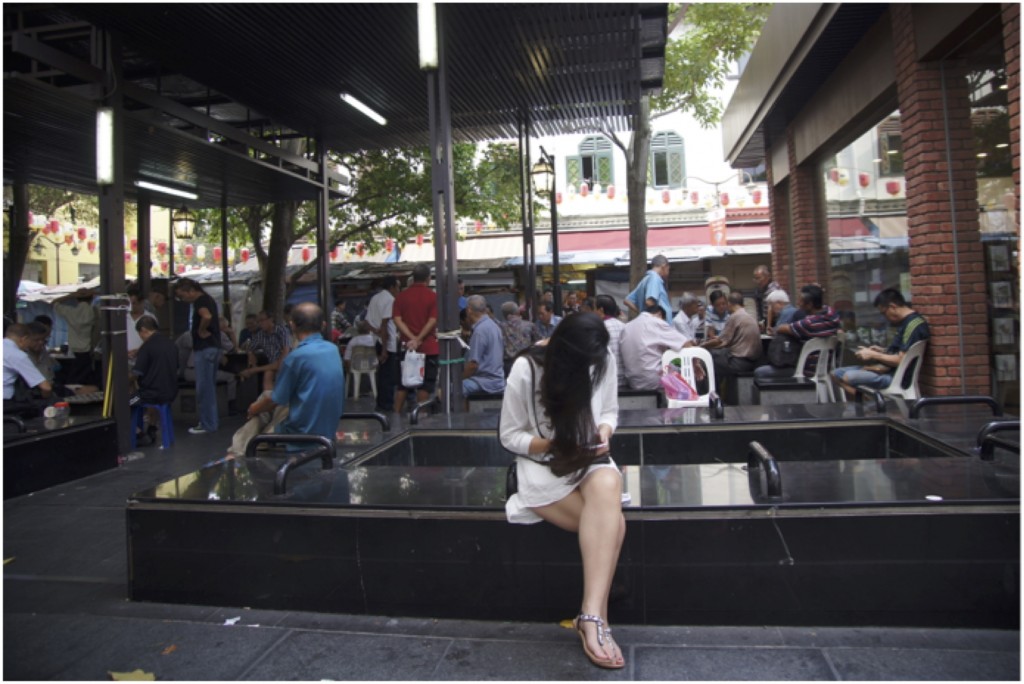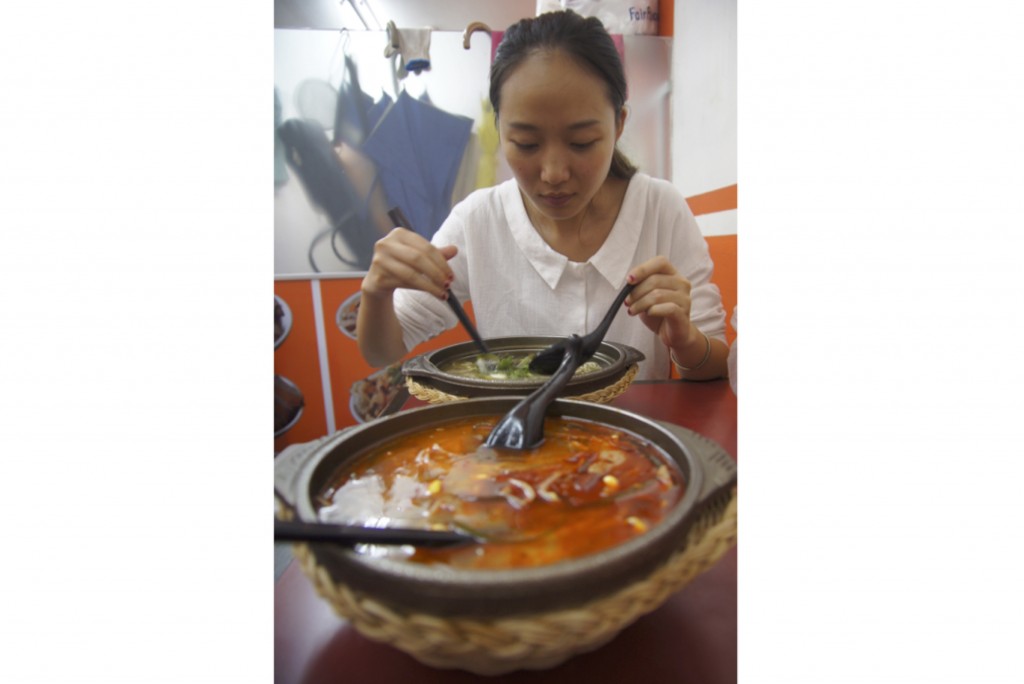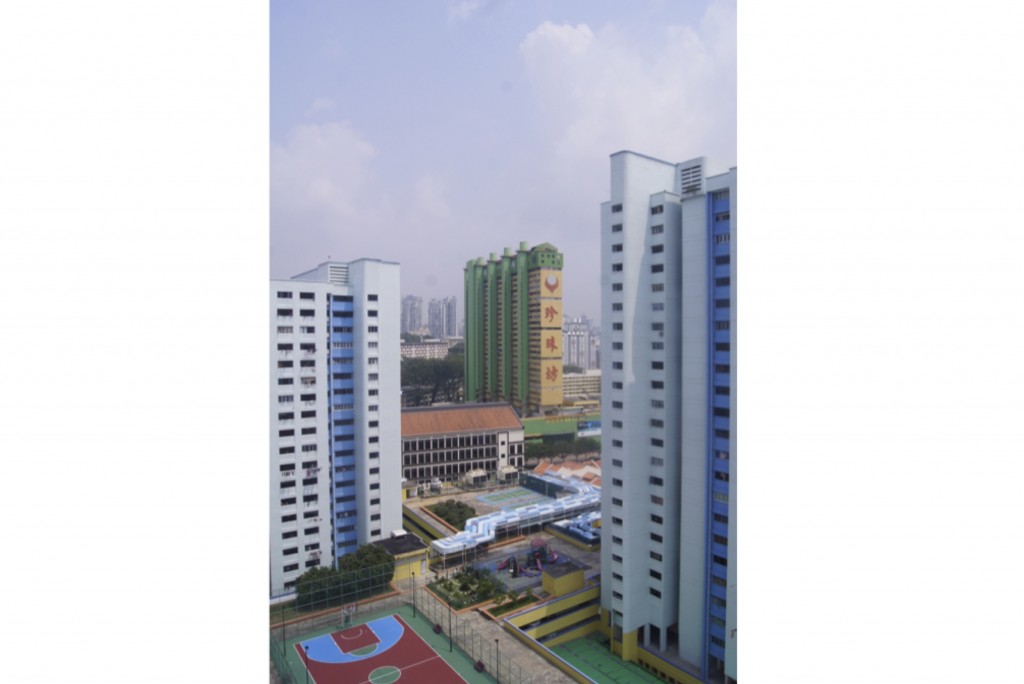Chen Enjiao (陈恩娇)
I am in my 20’s and graduated from Nanyang Technological University with a major in Economics and a minor in Entrepreneurship. I am driven by a sense of curiosity and wonder about the world. I love travel because I am addicted to the joy of being alive. I write as an attempt at sense-making, and take photos to keep a visual diary of my life. 我是个80后,新加坡南洋理工大学毕业,主修经济学,辅修创业。生性好奇的我受世界所带来的惊异感所驱使,热爱旅行;因为活着很好。文字,是我试图组织意义的一种方式;照相,是我生命的视觉日记。
May 12, 2015
Making a Home, Who Belongs Here? 成家,属于谁的家?
Visiting Chinatown, a foreign friend observed that Singapore had the widest generation gap among all the countries and cities she had been to. After some reflection, I thought she hit the nail on the head.
一位外国朋友游览牛车水后,发觉新加坡在她去过的国家和城市中,有着最大的代沟。我花了一些时间思考,觉得她这句话一针见血。
Having spent my childhood outside Singapore, there was little in the way of Chinatown’s physicality and architecture that aroused my curiosity. Chinatown was only a place I visited when I wanted to bring foreign friends to a free outdoor tourist attraction. It was only through the social memories, and the meanings Chinatown carries for immigrants that I found resonance with this place – both as a second-generation immigrant and as a young person who sees the nation’s forefathers exhibiting a sense of courage and risk-taking that we have lost. Perhaps this loss is the curse of our nation’s success.
我在新加坡以外度过我的童年,因此牛车水的地理特质和建筑并无法引起我的好奇心。只有当外国朋友来访时,我才会想到牛车水去,带他们参观免费的户外旅游胜地。唯有通过社会的记忆,还有牛车水对移民社会的意义,我才会对这个地方产生共鸣。我是一个年轻的第二代移民,也同时觉得我们已经失去了建国先辈的勇气和冒险精神。也许这样的损失,是我们国家成功的诅咒。
I will often conflate my immigrant status with that of a local, because modern Singapore, after all, is a very recent construct. It is a country that should not exist, according to Mr. Lee Kuan Yew in a 2007 New York Times interview. Before modern Singapore there were Malay dynasties, then waves of immigrants over the centuries, from India, China, Southeast Asia and the British Empire. Many of these immigrants grew to become our current heartlanders. If we stretch our historical imagination far back enough, who can really lay claim to this place, to say who is a true Singaporean?
我经常把自己的移民身份和本地人的身份混淆,毕竟现代新加坡在历史上是非常新的建构。李光耀先生曾在2007年的《纽约时报》访谈中说过新加坡是不应该存在的国家。在现代新加坡之前,这个岛屿曾见证过马来皇朝的兴衰,之后是连续几个世纪来自印度、中国、东南亚和不列颠帝国的移民潮。如果我们把历史的想象追溯得更早,谁能真正地拥有这个地方,说自己才是真正的新加坡人?
The more that I learn about Singapore’s past and how our major Chinese, Malay, Indian and other categories came to settle here, the more these lead me to question: who ultimately owns this territory, or nation – especially when ideas about nationalism are a recent Western “export” and that national boundaries constantly evolve? These artificial barriers seem to amount to nothing but social constructs we have created to demarcate that this is mine and that is yours.
当我对新加坡的过去有了更深的认识,了解华族、巫族、印族和其他种族是如何来到这里定居后,我就开始怀疑到底是谁拥有这个领土或国家。特别是民族主义是最近的西方“舶来品”,而国家界线却不断地变化。这些人造的隔阂似乎没有意义,它们只是社会建构,让我们标出这是我的,那是你的

Picture (1): Generation gap Chinatown—Are the young alienated from the old?
图1:牛车水的代沟——年轻一代是否和老一辈有了隔阂?
In the background, you see a scene typical of Chinatown: old men playing chess and in the foreground, a young woman is engaged in a modern form of leisure, fiddling with her mobile phone. What better visual evidence of the local intergenerational gap than this? With every overseas trip, every visiting foreign friend, my previously unquestioning eye has started to notice how the elderly collecting dishes for a living, at hawker centres is Uniquely Singapore. I also started to notice how lonesome it must be, for them, not to know English in a place like this. And it seems like our pioneers that we are so eager to worship in national discourses are both mythologized and victimised at the same time.
照片背景是牛车水的典型画面——老人在下棋。照片中有一个年轻的女性在玩手机,这却是现代的消闲活动。还有什么比这个视觉证据更能说明本地的隔代沟壑?每一次的旅行,每一个来访的外国朋友,都让我以前没有质疑的眼睛开始注意到老人家收碗碟谋生是新加坡独有的现象。我也开始注意到他们在这个地方不懂英文,难免觉得孤单。我们在国家舆论中竞相崇拜的先辈,似乎同时被神化和受害。
As we worship their contributions to the building of this nation, we talk about exporting elderly people to Johor Bahru, because it is too expensive to house them in local nursing homes. We create conditions in which these nation-builders are strangers in their own homes. Hollywood and neoliberal voices have drowned out our dialect tongues.
我们崇拜他们建国的贡献,同时说要把老奶奶出口到新山,因为新加坡疗养院的费用太昂贵。我们创造了一些条件,让这些建国者在家乡成为异客。好莱坞和新自由主义的声音,为我们的方言消了音。
From an early age, I was educated in China the traditional way, where the idea of learnedness was reciting the Classics. Then I was schooled in Singapore from age 9 till my recent graduation from Nanyang Technological University. Because of this, I can feel the practical ramifications of Singapore’s past choices on my own life. It was through my conversations with Gray (said foreign visitor) that it dawned on me that the ability to cook authentic Hainanese cuisine, to grow my own pandan leaves to flavour Hainanese Chicken Rice, to pack dumplings would be lost on me. In my parents’ rush for me to receive an education and in the collective social acceptance of economic growth as the primary goal, we, the younger generation, have lost sight of culture and traditions – the things that root us in an age of rapid mobilities.
我从小在中国受传统教育,学问是由朗读古文经书以授。之后,我9岁那年开始在新加坡受教育,直到最近从新加坡南洋理工大学毕业。因此,我可以感受到新加坡过去的选择如何影响了我的生活。我通过和格雷(那位外国访客)的对话,发现我将无法烹调正宗的海南菜肴或栽种班兰叶为海南鸡饭调味。我也无法学会包粽子。我父母急着让我受教育,而这个社会推崇经济增长为主要目标,我们年轻一代已经看不见让我们在迅速变迁中扎根的东西——文化和传统。
I see a sense of alienation in the photo. A lone, young figure set against a backdrop of numerous, older people.
这张照片给了我一种疏离的感觉。许多老人在照片背景,衬托出一个孤单、年轻的身影

Picture (2): Being part of the humanity near Chinatown Station Exit D’s Chongqing eatery.
图2:在牛车水地铁站D出口的重庆小吃店发掘人性。
Walking around Chinatown with Gray, we claimed this little Chongqing eatery, in People’s Park Complex, as our favourite hangout. I took this photo because I chose the spicier option, while Gray as the Chongqing native, really ought to be better at taking spices than I. Yet the physical geography that we were born into is not destiny – I find that humans tend to forget about the innate diversity in samples of human populations and assume that all Chinese from the People’s Republic of China are loud, raucous and impolite, for example.
我和格雷在牛车水走动,并把一个在珍珠坊的重庆小吃店封为我们最喜欢的去处。格雷是重庆人,应该比我更能吃辣,可是我却选了更辣的口味,我因此拍下了这张照片。我们的出生地不是宿命——我觉得人们经常忘记人类中存在的差异。譬如,人们经常会以为所有来自中国大陆的华人都是无礼、吵闹、经常大声喧哗的一群。
This shop has since become my default dining place in Chinatown, more so than its plethora of other famous local stalls. I find it interesting that Chinatown station Exit A (into Pagoda Street) and Exit D (People’s Park Centre) can be such distinctly different renditions of what my mind registers as one place. Emerging into the street from Exit A, one is greeted with an eye-dazzling array of souvenirs and crowds of European tourists; exit D on the other hand, showcases pockets of Chinese foreign workers sitting around on staircases and has one Chinese eatery lined up after another.
尽管牛车水有许多著名的本地小吃摊子,这家店已经成了我在牛车水必去的用餐地点。我觉得牛车水在我的脑海里是一个地方,可是地铁站A出口(通往宝塔街)和D出口(珍珠大厦)却是截然不同的演绎。自身一人从A出口前往大街上,就能看见令人眼花缭乱的纪念品和成群金发碧眼的游客。如果他使用D出口,就会遇见来自中国的客工三三两两地坐在楼梯间,还有罗列成行的中国小吃店。
As a second-generation immigrant, I see my mom’s dreams and aspirations in all these new souls pouring into exit D. Northerner or Southerner, skilled or unskilled, they are all inspired by that same timeless, human desire: to forge a better future for themselves and their families. Of course, foreign workers who become indebted just to come here would have it worse, but I can see that same spirit that drove the earliest pioneers into Singapore – as coolie or plantation worker, as rickshaw puller or domestic helper – living on in these new weather-beaten faces – doing work that no local would willingly enter into.
身为一个第二代移民,我在这些涌入D出口的新移民身上看见我妈妈的梦想和抱负。不论是北方人还是南方人,不论是否有一技之长,他们都在为自己和家人创造一个更美好的未来。这是人类永恒的共同愿望。当然,为了来这里打工而背负债务的外国客工境遇会更糟,但我可以在他们身上看见早期来新加坡开垦先锋的精神。当年他们是苦力、种植场工人、人力车夫、家庭帮佣。现在他们是这些饱受风霜的新面孔,做着没有本地人会愿意做的工作。
If history has anything to tell us, it is indeed that human nature can stay rather constant through time. The human mind is predisposed to create in-groups and out-groups, and competitive pressures easily hold sway over the greater ideals of humanism.
如果历史能告诉我们一些什么,那就是人性不会随着时间改变。人们会对一些社会群体产生认同感,并排斥另一些社会群体,而竞争压力很容易战胜崇高的人道主义理想。
Might we say that the workers of Little India and the drivers from China that protested are a lot more like Singapore’s forefathers (so predominantly featured in our major discourses) than we are? We, who would consider any enclosed space without air-conditioning a travesty; we, who would expect any customer service agent to respond to our desire to complain within seconds.
我们或许能说那些来自中国的司机和在小印度抗议的工人比我们更像新加坡的先辈(这些在我们主要舆论中占有如此重要地位的人)。我们这些人会觉得处在没有空调的密封环境是一件荒唐的事。我们会要求任何客户服务人员在几秒钟之内回应我们的投诉。
My mom’s education was disrupted as a result of China’s Cultural Revolution. While I progressed from primary to secondary school, she switched jobs: from garment factory work, paying piecemeal rates to being a hawker assistant, at the whims of economic restructuring. While I read about productivity and the need to increase capital-labour ratio via automation, she washes dishes with her bare hands at work. She wants to be a citizen. I know that in economic terms she is really more of a liability to this nation than asset, given her age and limited education. Did the majies – Chinese domestic helpers who worked in Singapore between 1930s and 1970s – and samsui women – another group of Chinese immigrants who came to work in construction and industrial sites – of yore face a similar predicament then eventually decided to return to China?
中国的文化大革命让我的妈妈无法完成学业。当我从小学升上中学时,我妈妈也换了工作。她本来在制衣厂领着以件计算的酬劳,后来就当上了小贩助理,这就是经济重组的代价。当我从课本上学到生产力的概念,还有以自动化提高资本/劳动比例的理由时,她在工作场所赤手洗碗碟。她真正地想成为新加坡公民,但我知道以她的年龄和有限的教育程度来说,她是这个国家的经济负累,而不是资产。当年的妈姐(1930年代至1970年代来自中国的家庭帮佣)和红头巾(另一群在建筑工地和工业区工作的中国移民)是不是有过同样的困境,之后就决定回返中国?

Picture (3): Old and New immigrants huddled in the buildings of Chinatown – are they all that different?
图3: 旧和新移民挤在牛车水的建筑物里——他们是那么的不同吗?
What do we do about making Singapore home, and for whom?
我们要怎么做才能把新加坡当成家,这么做又是为了谁?
Such is why when a local tenant kindly let us into his apartment in People’s Park Complex, and shared with us about how some owners divided a 5-room flat into 11 “sub-rooms” to rent out, it struck me immediately that our past is not behind us. Previous generations of immigrants lived in overcrowded conditions, across the road, in shophouses in Chinatown because it was all they could afford. Times have changed, the new immigrants may have moved into flats, but they are still seeking better futures and squatting together in cramped conditions, occasionally prone to fires.
一位本地住客很友善地让我们参观他在珍珠坊的房子,并告诉我们有些屋主可以把一个五房式组屋拆分成11个“小房间”出租。我忽然发现我们的过去离我们并不远。上一代的移民住在马路对面的牛车水店屋,忍受了拥挤不堪的环境,因为他们当时只负担得起这个选项。时代改变了,新移民或许已经搬进组屋,但他们还挤在窄小的空间里寻找更好的未来,有时候还会成为火灾的受害者。
Do we say that they deserve no equal treatment because they received the short end of the stick through bad chances at birth? No doubt such was the context under which students, workers and relevant post World War-II Singapore nationalists rebelled.
我们能说他们因为出生时没有抽到好签,所以不值得被公平以待吗?无可置疑,二战后的学生、工人和相关的新加坡爱国分子也是在这样的情况下造反。
The photo of flats in Chinatown illustrates the various installations the government has made to promote vibrancy in local built-up communities. But all the hardware in the world can’t function on software that operates as if it is holier-than-thou.
这张照片说明了我们如何在本地社区建设各种装置,让它们显得更有活力。但就算我们有了全世界的硬件,也不能依靠自以为是的软件运转。
While human nature can stay rather constant through time, it is within this nature of ours to dream of greater things as well. The logic of history demands that the old and the new, the insider and the outsider, find ways of working towards a new equilibrium because we have all been scattered far and wide away at some point. Therein lies my hope.
随着时间流逝,人性可以维持不变,但我们本性中也怀有更远大的梦想。我们都曾在某个时候被吹散至远方,所以历史的逻辑需要新的、旧的、当局者、旁观者,共同寻找一个新的平衡点。这是我的愿望。
译/胡爱妮










